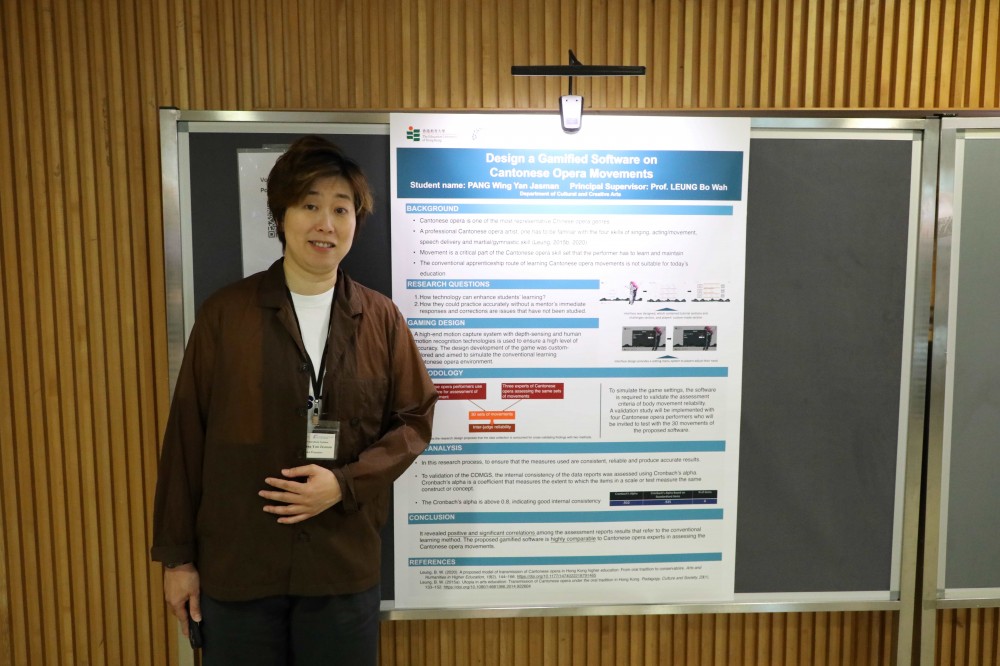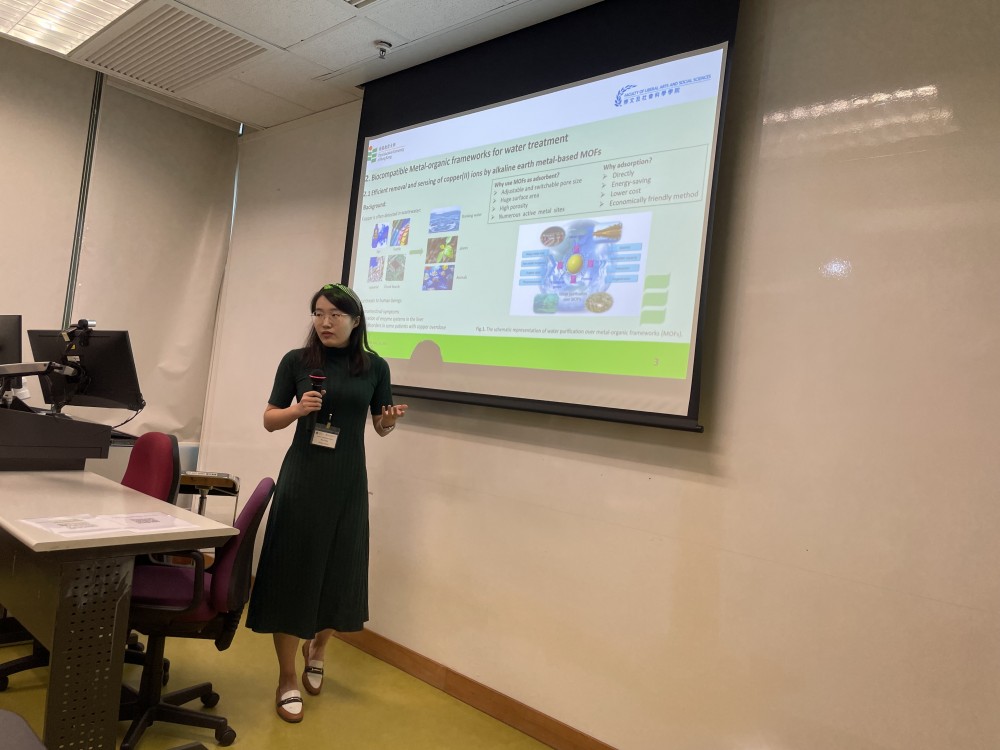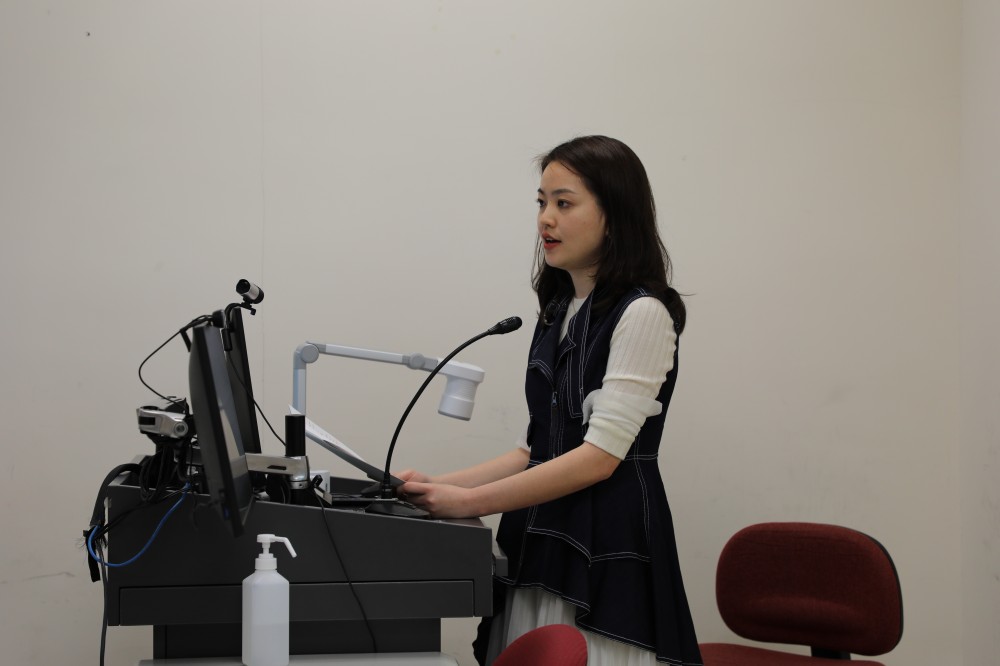Interviews with the best poster and oral presenters at the faculty postgraduate seminar
FLASS inaugurated the Faculty Postgraduate Seminar in the 2019/20 academic year, the seminar, which was held once or twice every year, has become a valuable platform for hundreds of postgraduate students from different departments under FLASS to present their research works. In the latest postgraduate seminar held on 9 April, sixteen students presented their works at the morning poster presentation session or the afternoon oral presentation session. The afternoon session was separated into science or social science panels.
After their presentation, a vote took place among students to determine the best presenters. While Ms Jasman Pang Wing-yan from the Department of Cultural and Creative Arts (CCA) won the best poster presenter title, Ms Wu Chen from the Department of Science and Environmental Studies (SES) and Ms Qiu Yue from CCA were voted the best speakers for the science and social science panels respectively. In this issue of FLASS FORWARD, we interviewed Ms Jasman Pang and Ms Wu Chen to understand more about their research work, what they have learnt from the seminar, and their opinions about the research environment of the University.
Ms Jasman Pang, a Doctor of Education (EdD) student supervised by Professor Leung Bo-wah, Executive Director of EdUHK’s Xiqu and Intangible Cultural Heritage Centre, is working on a project to design and develop a gamified software to teach Cantonese opera movements. “Movements are a critical part of Cantonese opera skill set that performers have to learn. However, the conventional apprenticeship system for learning Cantonese opera movements does not drive motivation among today’s learners. My project is to enhance students’ learning motivation through a gamified environment. The software has been designed in such a way that learners can practice the movements accurately without a mentor’s immediate responses and corrections,” Jasman explained.
Jasman, in her final year of EdD study, said the research seminar offered her an opportunity to improve her public presentation skills in the academic world. “Teachers and fellow students asked me many relevant questions during my poster presentation. Their questions prompted me to think through my research questions, research design, and findings again. They also gave me professional insights about how to improve my research. At the seminar, I have discussed with other postgraduate students about research topics of shared interest. It helped me widen my network in the academic circle,” she said.
He always gives me comments that help me address those difficult issues during my research. His guidance has empowered me to become a scholar.
The EdD candidate said EdUHK provides an incredibly supportive research environment. “The University offers various kinds of motivation schemes to its postgraduate students, such as publication awards and conference presentation awards. My supervisor Professor Leung, an esteemed scholar in the field, has extraordinarily rich experience in incorporating Cantonese opera into formal music curriculum. He is very patient in guiding me through my research progress and challenges. He always gives me comments that help me address those difficult issues during my research. His guidance has empowered me to become a scholar.”
Ms Wu Chen is in the second year of her PhD studies under the supervision of Professor Keith Ho Wing-kei, Head of SES. Her doctoral research focuses on how to synthesise biocompatible Metal-organic Frameworks (MOFs) materials for environmental conservation. To understand her research, we need to have basic ideas about what are MOFs materials.
MOFs materials are a class of porous material that have gained significant attention in recent years due to their unique structural and chemical properties. MOFs materials are composed of metal ions or clusters coordinated with organic ligands, forming a three-dimensional network with a high surface area and well-defined pores. These characteristics make them promising candidates for various applications, including water treatment, photocatalysis for nitrogen oxide (NO) removal, and antibacterial applications. With further research and development, MOFs materials have the potential to revolutionise environmental studies, providing sustainable and efficient solutions for tackling environmental challenges.
“We have successfully used MOFs materials as adsorbents to remove pollutants from water. This is the first environmental application of the material. My initial attempt was to synthesise alkaline-based MOFs materials to remove copper ions from aqueous solutions, followed by a subsequent study of removing ketoprofen and piroxicam from aqueous solutions by iron-based MOFs materials. Both of these studies have been successfully completed with related papers published. My current research focus is on applying MOFs materials as photocatalysts for removing NO at lower concentrations,” Ms Wu Chen said. She added that the latest synthesised MOFs materials have shown the ability to remove over 70% of NO at an initial concentration as low as 650 ppb. And despite undergoing seven usage cycles, the material exhibits remarkable stability.
One of such feedback was that I didn’t have enough eye contact with the audience during my oral presentation. I will pay more attention to this in the future.
Ms Wu Chen said the postgraduate seminar was very useful. “Most of the students joining the conference will become future teachers or researchers. In either case, they need to learn how to present in front of a class. The panel presentation gave me valuable opportunities to rehearse, receive feedback, and understand my weakness both in terms of presentation skills and research work. One of such feedback was that I didn’t have enough eye contact with the audience during my oral presentation. I will pay more attention to this in the future. When the floor was open after my presentation, one attendee raised a valid point about my research. I will delve into his point and address it in my future research work,” she said.
Ms Wu praises the supportive and friendly research environment of the University. Like other postgraduate students working on experimental-based research, Ms Wu spends most of her time in the laboratory. “In the lab, research students often come together to exchange ideas about their research. Even though our research focuses are different, our conversations sparked inspiration for my own research project. When technical problems arise, I would seek advice from other students who conduct research in similar fields,” she said.
Ms Wu records all the problems encountered during her laboratory work and discuss them with her supervisor Professor Ho during their biweekly meeting. “Professor Ho helps me characterise my problems. Some of which he answers forthrightly, while the others he would drop hints to encourage me to figure out for myself,” she said. Hailing from Qiqihar in the Heilongjiang province, Ms Wu likes EdUHK’s campus much. “The campus is extremely peaceful, and the library and laboratory are highly accessible. I enjoy studying here,” Ms Wu said.
Click here to read about the Faculty Postgraduate Seminar.
Best poster and oral presenters:
|
Name of Students (Dept) |
Research Topics |
RPg / EdD |
Name of Principal Supervisor |
|
|
|
Ms Jasman Pang Wing-yan (CCA)
|
Design a Gamified Software on Cantonese Opera Movements |
EdD |
Professor Leung Bo-wah |
|
Best Speaker – Science |
Ms Wu Chen (SES)
|
Synthesis and Characterization of Biocompatible metal-organic Frameworks for Environmental Applications |
RPg |
Professor Keith Ho Wing-kei |
|
Best Speaker – Social Science |
Ms Qiu Yue (CCA)
|
Visual Arts Learning Experience and Teaching Practice of Novice Kindergarten Teachers |
EdD |
Dr Thomas Tam Cheung-on |








